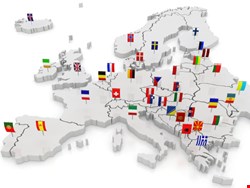
Most of the reports concentrate on emails. The implication is an intention to develop a European capability to keep emails and other communications within Europe. "Above all", she said (according to Reuters) in this Saturday's weekly podcast ahead of a visit to France on Wednesday, "we'll talk about European providers that offer security for our citizens, so that one shouldn't have to send emails and other information across the Atlantic. Rather, one could build up a communication network inside Europe."
"Hollande's office [in France] confirmed that the governments had been discussing the matter and said Paris agreed with Berlin's proposals," says Reuters.
The reality, however, is that the two governments will be discussing more than emails, and something more akin to a new European internet. France has laws that allow extensive intelligence agency monitoring of its own citizens; but is very upset when outside agencies do so. Germany, however, has very strong views on its citizens' privacy, probably left over from the combined legacy of both Nazi and Stasi surveillance. The result is likely to evolve into a European internet.
"By creating a 'European internet,'" reported The Local this morning, "all servers and cables would be based in Europe meaning they would be subject to European data protection laws. 'Google or Facebook can naturally go where privacy is at its lowest and we in Europe cannot approve this in the long run,' Merkel said."
If a European internet does evolve, it will push Britain further towards the political periphery of Europe. Because of GCHQ's close and working relationship with the NSA, Britain will undoubtedly – almost necessarily – be excluded; and that will prove difficult for both political influence and business development in the UK. But the British government is showing little inclination to even discuss GCHQ surveillance, nevermind curtail it.
One of the side-effects of the surveillance scandal has been to re-invigorate the Franco-German European axis. When Conservative David Cameron became prime minister, there was brief honeymoon period when the natural alliance of conservative minds (Cameron/Merkel) promised greater European collaboration. Cameron's subsequent determination to renegotiate more favorable EU membership terms or leave, coupled with GCHQ spying on its European allies has now pushed conservative Germany and socialist France into closer collaboration.
Britain now faces the prospect being outside of the European Union both politically and technologically.